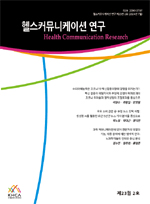- 영문명
- Redesigning Happiness: Implications of the Function-Indicator Model and Self-Acceptance for Health Communication
- 발행기관
- 한국헬스커뮤니케이션학회
- 저자명
- 안도현(Dohyun Ahn) 김선경(Sunkyung Kim)
- 간행물 정보
- 『헬스커뮤니케이션연구』제24권 2호, 39~80쪽, 전체 42쪽
- 주제분류
- 사회과학 > 신문방송학
- 파일형태
- 발행일자
- 2025.08.31

국문 초록
기존 행복 연구는 의미(eudaimonia)와 쾌락(hedonia) 간의 이분법에 갇혀 통합적 이해에 이르지 못했다. 이론 공백 탓에 행복을 추구할수록 오히려 행복이 줄어드는 ‘행복의 역설’ 현상을 설명하지 못했고, 효과적인 행복 증진 소통 전략도 부재했다. 이에 본 연구는 먼저 건강을 삶의 도전에 대처하는 역동적 적응 능력으로, 행복을 그 토대 위에서 잠재력을 실현하는 번성의 과정으로서 위계적으로 재정의한다. 나아가 행복의 과정을 설명하기 위해 기능-지표 모형(function-indicator model, FIM)을 제안한다. 이 모형에서 행복의 기능은 기본 심리 욕구의 충족과 자기수용을 통해 삶의 목표를 향해 개인적 성장을 이뤄내는 과정(의미 행복)으로 정의된다. 이 과정에서 역경은 피해야 할 장애물이 아니라 성장을 촉진하는 필수적인 요소로 간주된다. 반면, 감정과 삶의 만족은 기능이 원활하게 작동하고 있음을 나타내는 지표(쾌락 행복)에 해당한다. 본 연구는 행복 추구의 역설에 대한 해법으로 자기 수용의 역할을 탐색하여, 지표(쾌락)를 직접 추구하는 것이 아니라, 기능(의미)을 강화하는 근본적인 심리적 토대로서 자기 수용을 증진하는 것이 지속 가능한 행복의 핵심임을 논증한다. 궁극적으로 본 연구는 자기 수용 증진에 관한 상담심리학과 소통학의 성과를 융합하여, 지표가 아닌 기능에 초점을 맞추는 건강생성적 행복 소통 패러다임의 가능성을 탐색한다.
영문 초록
Existing happiness research, constrained by the dichotomy between eudaimonia (meaning) and hedonia (pleasure), has failed to achieve an integrated understanding. This theoretical gap cannot adequately explain the ‘paradox of pursuing happiness’—where seeking happiness diminishes it—and has led to a lack of effective communication strategies for enhancing well-being. To address this, the present study hierarchically redefines health as a ‘dynamic adaptive capacity’ to cope with life’s challenges, and happiness as a ‘process of flourishing’ that builds upon that foundation. We then propose the Function-Indicator Model (FIM) as a theoretical framework to explain this process. In this model, the function (eudaimonic happiness) is the process of achieving personal growth toward the purpose of life through the satisfaction of basic psychological needs and self-acceptance. Within this process, adversity is not an obstacle to be avoided but an essential catalyst for growth. In contrast, the indicator (hedonic happiness)—emotions and life satisfaction—signals how well the function is operating. This study posits self-acceptance as the key solution to the happiness paradox, arguing that sustainable happiness lies not in pursuing the indicator (pleasure) but in strengthening the function (meaning) by cultivating self-acceptance as its psychological foundation. Ultimately, by integrating insights from counseling psychology and communication studies, we explore the potential for a new paradigm of salutogenic happiness communication that prioritizes function over indicators.
목차
1. 왜 행복인가?
2. 건강과 행복의 재정의
3. 행복의 기능과 지표
4. 기능-지표 모형과 자기 수용의 소통적 함의
5. 결어: 건강생성적 행복 소통을 향하여
참고문헌
키워드
해당간행물 수록 논문
참고문헌
최근 이용한 논문
교보eBook 첫 방문을 환영 합니다!

신규가입 혜택 지급이 완료 되었습니다.
바로 사용 가능한 교보e캐시 1,000원 (유효기간 7일)
지금 바로 교보eBook의 다양한 콘텐츠를 이용해 보세요!



